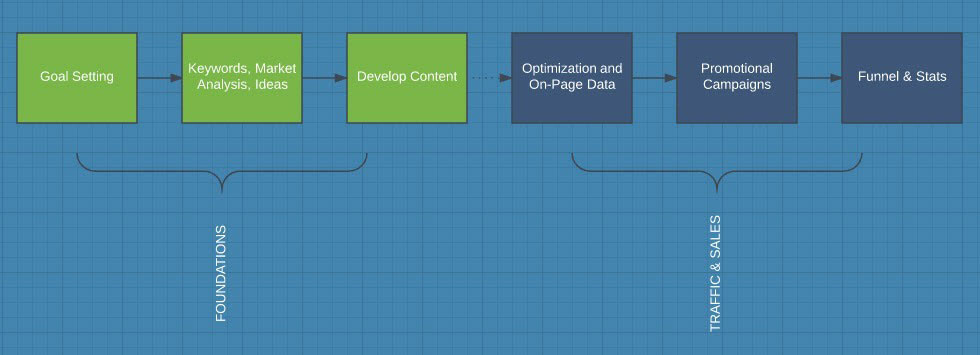Content Strategy & Content Marketing
What is Content Marketing – Definition?

“How To Find Gold From Within”
Authority, Trust & Leadership Example
Notice: This advertisement was pulled from Entrepreneur Magazine. These are three leading books in the “Ultimate Guides Series”.
They are:
Ultimate Guide to Google Adwords by Perry Marshall
Ultimate Guide To Search Engine Optimization by Jon Rognerud
Ultimate Guide to Pay Per Click Advertising by Richard Stokes
These books have all become best-sellers in their market.
It also has helped the authors raise visibility and authority for their own brands.
Getting a publishing deal may not be an overnight job, but working to create content, publish and connect with primary audiences (that actually enjoy and want to consume this information) is.
Once you understand about the power of content marketing and getting published, you should ought to sit down and start writing – today! And, you don’t need an official degree, the materials can be less ‘official’.
For example, a simple 40-50 page targeted ebook with an “Ultimate” or “Definitive” guide title for your market can be quite successful.
Content Development And Content Marketing Process

Questions To Ask Before Starting Content Marketing Projects
A well-developed content strategy will be your best friend during this journey to success. You must focus your efforts on improving your entire content ecosystem.
Top level activities that should be included:
Assessment, analysis & strategy (more detail below, ‘content strategy’)
Architecture & Editorial
Implementation
Maintenance
With key stakeholders in the room, start by asking these content strategy questions:
What (“what are we going to do”) Social media, video, podcasts…(this is the easy part)
Why (“why are we doing this in the first place”?) PR, links, leads, visibility, customers ask
How (“how are we going to do this”?) Skillsets, time, source content
When (“when is this going to get done”?) Estimation of scope of content
For Whom (“who is the content for”?) Do you have audience segments, personas?
By Whom (“who is going to create it”?) Agency selection, writers, etc
With What (“what do we have to work with now”?) Content audits should be used
Where (“where is that content going to be published”?) Promotion, amplification, why?
How often (“how often should you publish”?) Frequency and commitment
What’s next? (“What’s going to happen when content is out there”?) Be strategic
The content strategy must be documented, and cover these things:
Business goals and success metrics
Audience segments and their needs
A content strategy statement and guiding principles (a “policy guide”)
Priority areas of focus
Your company roadmap for implementation
Why Content Marketing?
Content creation + intelligent marketing can and will bring quality transactions to your business.
Those include:
thought leadership,
lead generation,
increasing direct sales,
introduction of specific brand language,
improving customer retention and
helping to determine best pages/content for the highest conversions.
However, the efforts and manpower that goes into creating new content for a business are burdensome, to say the least.
Recent research within the B2B marketplace shows that completely new content development is not only hard for organizations to do, but because of limited resources and understanding of options, it’s nearly impossible.
What marketing medium to use?
And, when asked about what marketing initiative to start now for getting products and services out there, most of you would buy TV ads, radio spots, advertising in magazines, newspapers first. Fewer would invest in content marketing. In fact, A big 70% of your budget goes to traditional media, and only 30% towards content marketing, according to a recent study. Our business environment has changed, and today you must consider things like:
And, that is only a short list.
However, not every content piece is built the same way, as you’ll learn next. The landscape is changing. Today, you must think and act as a publisher. How do you create compelling information to your target audience. It should be content-based. You talk about what your readers need, not what you are trying to sell them. It’s a big shift. Put your customer first, and map to that.
A publisher creates an editorial plan. And, you need to promote it.
Do you have it in place?
Content Types
When we look at the various ways to create & optimize content, the list goes something like this: (most difficult to least difficult for companies to do in-house):
New content creation
Blogging
On-page content optimization
Competitive research
Social media integration
Sitemap development & XML
Keyword research
Online PR distributions
Meta data optimization
Title tag optimization
Video is popular, and YouTube is the 2nd largest search engine in the world. You should work on a video strategy.
Easy to say, but harder to create content for. Lack of creativity is a big part of this challenge.
And, because of recent and significant changes at Google (The “Panda” Update), unique content and quality content is more important than ever. You don’t want to get smacked by the Google Panda or the Google Penguin Penalties. It can and will totally pull you out of the search engines. Your brand suffers for it.
What is content marketing?

“Content marketing is an umbrella term encompassing all marketing formats that involve the creation or sharing of content for the purpose of engaging current and potential consumer bases. Content marketing subscribes to the notion that delivering high-quality, relevant and valuable information to prospects and customers drives profitable consumer action. Content marketing has benefits in terms of retaining reader attention and improving brand loyalty.”
Wikipedia
What does Google say about quality content?
Amit Singhal, a software engineer at Google, Inc recently spoke to our search community about what quality content means to Google. I turns out there are set of questions and a standard to consider. Here is the list of Google’s mindset when it comes to the question: “what is quality content”?
1. Would you trust the information presented in this article?
2. Is this article written by an expert or enthusiast who knows the topic well, or is it more shallow in nature?
3. Does the site have duplicate, overlapping, or redundant articles on the same or similar topics with slightly different keyword variations?
4. Would you be comfortable giving your credit card information to this site?
5. Does this article have spelling, stylistic, or factual errors?
6. Are the topics driven by genuine interests of readers of the site, or does the site generate content by attempting to guess what might rank well in search engines?
7. Does the article provide original content or information, original reporting, original research, or original analysis?
8. Does the page provide substantial value when compared to other pages in search results?
9. How much quality control is done on content?
10. Does the article describe both sides of a story?
11. Is the site a recognized authority on its topic?
12. Is the content mass-produced by or outsourced to a large number of creators, or spread across a large network of sites, so that individual pages or sites don’t get as much attention or care?
13. Was the article edited well, or does it appear sloppy or hastily produced?
14. For a health related query, would you trust information from this site?
15. Would you recognize this site as an authoritative source when mentioned by name?
16. Does this article provide a complete or comprehensive description of the topic?
17. Does this article contain insightful analysis or interesting information that is beyond obvious?
18. Is this the sort of page you’d want to bookmark, share with a friend, or recommend?
19. Does this article have an excessive amount of ads that distract from or interfere with the main content?
20. Would you expect to see this article in a printed magazine, encyclopedia or book?
21. Are the articles short, unsubstantial, or otherwise lacking in helpful specifics?
22. Are the pages produced with great care and attention to detail vs. less attention to detail?
Common questions: content marketing strategies
A: Planning out the content scope in advance will be important. “Time” is relative, and it’s important you discuss this in advance. A SWOT analysis can be good place to begin.
A: In today’s markets, it’s impossible to have too much content. Content marketing is all about the right story, in front of the right person, at the right time.
There are billions of pages being served by Google every day, for example. There are millions of searchers and keywords. Google says that at least 25% of searches are completely new searches, not seen before. So, therefore, one post a week will not work, you have many more opportunities to grow and share your information.
A: The question is – what is the value – to whom? What problem are you trying to solve? Keyword research is the basis for this strategy.
You don’t have to be all about “your stuff”. Consider a wider expansion of your thoughts. Talk about the problems you solve, and not hard sells.
A: What question are you answering. Test and test. Find out why they need it, what problems you are trying to solve. You get a better picture, and different spins on the same thing. It gets shared and found in search. Case studies can be great.
A: Google Adwords is great place to start. And, search in Google, and type in what you think your company should be found for. Expand from there.
A: Policies are good to start, but also risk/reputation management. Many have blogs. People are smart, intelligent. Where does the liability ultimately lie? Create a system to moderate the content before pushing live.
Email to post can be good way to go. Import old emails/newsletters and curate them for blog. This content is not indexed, and search engines can use it, and so can your users. Old data is still relevant, unless discussing news. It’s often good quality.
Finally blogging, social media & SEO — content marketing drives all of that.
What to do next: Digital Content Marketing
If you are a content marketing manager and you have not fully engaged yet, now’s a great time. You will be continuing to struggle if you don’t address your company’s lack of quality content online. Google is taking the high road, leaving low quality and regurgitated content behind. So should you.
Getting quality web content working for your business will attract more visitors and turn them into customers. We can help you get the right messages to your audiences with optimized web copy, special reports, (SEO) landing pages, articles, press releases, whitepapers and more.
Everything in marketing online is a collective of many efforts. One approach will simply not do. However, when it comes to search engines and social media, great content is the fuel that lifts and propels your rocketship forward.
How to create a content marketing plan?
It’s easy when you know how. Our content marketing agency uses a simple process to get started. Find out how to leverage the search and social media landscape with the right messages and right targets.



